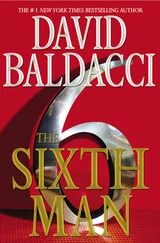The junior officer greeted Puller and led him into the interior office, which was of a size befitting the man’s lofty position. On one wall was the “wall of love,” as the Army liked to call it. It was a photo array of the VIPs smiling, shaking hands, and rubbing shoulders with the current occupant of this office.
And that would be Tom Pitts, around five eleven, built like a chunk of granite, with facial features to match. The grip of his handshake equaled that of Puller, who was around twenty-five years younger. The four stars rode well on his broad shoulders. He was one of only fourteen four-stars in the entire Army, and one of only forty-two in the entire Armed Forces of the United States. A combat veteran, Pitts had more than earned every medal and ribbon.
“I went by to see your old man the other day,” began Pitts.
Puller was a bit surprised by this, and his face showed it as they sat down across from each other on matching couches set next to Pitts’s desk.
“I didn’t know that,” said Puller.
“I would have given you a heads-up, but the fact was it was a spur-of-the-moment thing. We were passing by the VA hospital and . . . I just wanted to see Fighting John Puller.”
“You don’t need my permission, sir. I’m sure he enjoyed seeing you.”
“Your father’s forgotten more about leading soldiers into battle than I’ll ever know.”
Puller looked down. “He’s forgotten a lot, sir. Too much.”
Pitts’s features clouded. “A poor choice of words on my part. I’m sorry. I understand his condition is not . . . going to improve?”
“No sir, not unless there’s a miracle.”
Pitts nodded slowly, his features somber and faraway. Then he snapped back, like a crisp salute. “But you didn’t come here for that. What can I do for you?”
It took Puller about two minutes to fully bring Pitts up to speed. The general’s face grew longer and longer as Puller went on. When he was finished Pitts said, “I’m not sure I’ve heard anything that extraordinary. It’s inexplicable.”
“I thought the same. But with the roadblocks being thrown up, and as you used to be the head of CID, I thought you might want to be made aware.”
“And your chain of command?”
Puller cleared his throat and took a few moments to compose his response with great care. There was nothing so sacred in the Army as the chain of command. A soldier who went outside of it better have a damn good reason, and even that wasn’t always enough.
He ended with, “So, you can see that I went through all the usual channels, sir.”
“Yes, I can. And?”
“And none of my issues have been resolved. And my superiors seem to be as perplexed as I am.”
“That is not acceptable.”
“I thought you might see it that way.”
“You’re investigating crimes involving military personnel. You have every right to pursue whatever lead and whatever evidence comes your way. There is no provision for anyone blocking your access, civilian or military, and certainly not the government.”
“Well, some folks apparently have not gotten that message.”
“I will follow that up. You have a job to do and you should be allowed to do it.”
“Thank you, sir.”
“Leave it with me for now. But come back to see me in twenty-four hours. I’ll know more by then.”
Pitts stood and so did Puller. He knew the general probably had ten more meetings before he was going to call it quits for the day, and every one of them almost certainly dealt with far more pressing matters.
Puller departed and hurried back down the hallway. He had debated long and hard on whether to call in the chit represented by Pitts, but then decided he had nothing to lose.
Outside he stared back at the building that, ever since its construction during World War II, had been synonymous with the might of the American military. It had taken some heat during unpopular wars and been heralded when things turned out okay. Puller knew that was just the way the world worked. But at least the building was still here. Puller never hoped for war. No soldier he’d ever met did. But if it came to it, the country needed a place just like this.
Unfortunately, in a little over an hour he would be back in combat.
CHAPTER
30
PULLER JUMPED BACK ON THE METRO and rode it to the Reagan National stop, where he had left his personal car in long-term parking. He drove south on Interstate 95 to his apartment, where he found his cat, AWOL, lounging on the kitchen counter, his tail flicking back and forth like a furry metronome.
He leaned against the counter and spent ten seconds rubbing AWOL’s ears, which was the length of time AWOL allotted him before wanting to be left alone. An elderly neighbor came in and took care of the cat while Puller was away. And with Puller’s schedule, the neighbor probably saw more of AWOL than he did.
AWOL suddenly turned his luminous green eyes toward the window. Puller was on the second floor of an apartment building not that far from Quantico. CID headquarters was located there on Telegraph Road in the same complex as the Marine Corps base. He watched as AWOL crept over to the kitchen window and looked out. The cat’s tail went down and its back went up. Puller heard AWOL hiss.
Puller had been in the Middle East where the most innocuous sounds often led to the most deaths and destruction. Because of that, his internal antennae had been fine-tuned to such an extent that what he could hear and discern from it was almost otherworldly. He would use a different phrase for it.
It makes you a soldier who survives.
And it really helped when you had a cat with even better antennae than a human would ever have.
His M11 came out of its holster and he nudged AWOL with the pistol’s butt. The cat leaped off the counter, landed silently on the floor, and disappeared into another room.
There was only one door into and out of the apartment. There were two windows facing the street. There was no outside deck. It was just nine hundred square feet of a typical American apartment. Puller’s government salary was good, higher than the median pay, though far lower than he would have made in the private sector. He could have afforded a more luxurious place, but why pay for something he barely used? And it wasn’t like AWOL cared what his accommodations looked like.
He slipped over to the side of one of the windows and eased the curtain back. It was dark outside, but his eyes had been trained to see in the dark.
In the lighted parking lot were lots of darkened cars. But there was one where he could see steam rising off the hood because the motor was on and the falling rain was being heated. The car’s lights were out, so why sit there with the engine running?
Then he saw two shadows about fifty feet from the car and moving toward the building. They were moving slowly. That was a telltale sign because it was raining, and normal people hurried to get out of the rain. These were obviously not normal people.
He moved across the small space to his front door, opened it a crack, and peered out.
Stealthy footsteps scraped the steps.
Puller grabbed a to-go knapsack that he kept in the closet by the front door and threw it over his shoulder. He eased out of his apartment and closed the door behind him. He moved noiselessly down the outside corridor and took up position behind an ice-maker unit.
He took aim and waited.
The first figure appeared at the top of the stairs, stopped for a moment to look around, and then motioned to his partner to follow him up. They reached Puller’s door just about the time that Puller pushed two sound mufflers into his ears.
They checked the lock. Puller hadn’t left it open. He didn’t want to make it too easy for them. The first man pulled something from his pocket and worked away at the lock while the second man kept watch.
Читать дальше












